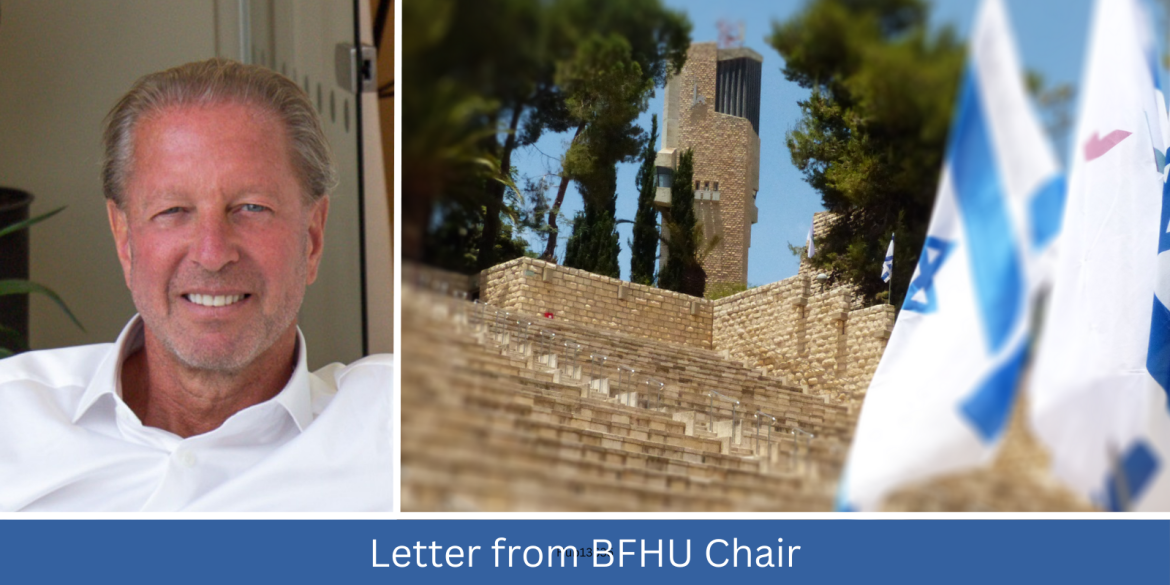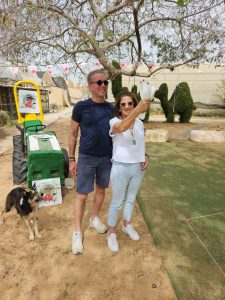
Next week Israelis will observe Yom HaZikaron, the national day of remembrance for those who have lost their lives in the defence of Israel and through acts of terror, followed the next day by Independence Day, marking 76 years since the establishment of the State. The juxtaposition of these two special days is designed to recall the price of establishing the State and safeguarding its existence before celebrating the miracle of its birth and continued existence. The transition from Yom HaZikaron to Independence Day is not an easy one, especially for those who have lost loved ones, and this year the sense of loss and collective trauma suffered by so many in the wake of 7 October and the ensuing conflict, will make this proximity even more poignant.
 Over Pesach I returned to Israel for the second time since 7 October. My first visit at the end of October was largely about seeing friends and colleagues to show support and hear their stories. 6 months on, with war still being waged and over 130 hostages still being kept in horrific conditions in Gaza, I took time to visit the areas most affected and to speak to a broader range of NGO’s, politicians and friends. Visits to K’Far Aza, Mefalsim, the Nova Festival Site, The Salad Trail near the Kerem Shalom Crossing and Sderot brought home the vulnerability of those communities in the Gaza Envelope and the importance of peace and stability in the area. Likewise, our trip to Tiberias to meet with displaced communities living in totally inappropriate hotel accommodation was a sharp reminder of the fact that this is a war with more than one front.
Over Pesach I returned to Israel for the second time since 7 October. My first visit at the end of October was largely about seeing friends and colleagues to show support and hear their stories. 6 months on, with war still being waged and over 130 hostages still being kept in horrific conditions in Gaza, I took time to visit the areas most affected and to speak to a broader range of NGO’s, politicians and friends. Visits to K’Far Aza, Mefalsim, the Nova Festival Site, The Salad Trail near the Kerem Shalom Crossing and Sderot brought home the vulnerability of those communities in the Gaza Envelope and the importance of peace and stability in the area. Likewise, our trip to Tiberias to meet with displaced communities living in totally inappropriate hotel accommodation was a sharp reminder of the fact that this is a war with more than one front.
The shock and anger I encountered on my visit last October has largely been replaced by an overwhelming sense of uncertainty and frustration. Uncertainty as to what will happen militarily and politically. Economic uncertainty, as the financial impact of the war begins to bite. Uncertainty about the fate of the hostages. Uncertainty about the safety of the young men and women of the IDF. And for the displaced communities of the South and North, uncertainty as to when they may be able to go home and, in many cases, as to where home will be, given their understandable reluctance to return to the scene of 7 October’s atrocities. Frustration at the rest of the world’s inability to acknowledge Israel’s dilemma and frustration at the events taking place on campus in America and the UK and on the streets of London.
There is no doubt in my mind that Israelis need and appreciate the support of the diaspora more than ever right now. Solidarity, closeness, unity, call it what you will. If you have not already been or made plans to go, I urge you to get on a plane, visit Hostage Square in Tel Aviv, pray at the Kotel, see the new normal, feel the temperature and show your Israeli family and friends that your heart is with them. As Friends of the Hebrew University, we are working to rally, connect, strengthen and preserve the bond between the Diaspora and Israel in academia and beyond. In a few weeks, a UK delegation will unite with our Friends from around the globe at the University’s Board of Governors in Jerusalem, which is dedicated this year to the We Are One campaign. I am certain it will be an emotional event marking 99 years since the University’s founding.
On the occasion of Memorial Day and Independence Day, I wish for the speedy release of the hostages, an end to bloodshed and for a time that Israelis may be able to live in peace alongside their neighbours.
Alan Jacobs, Chair
